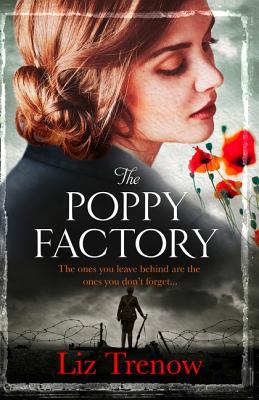eBook: 118 KB 402 pages
Genre: Historical Fiction
Publisher: Avon 2014
Source: Amazon Kindle
First Sentence: An uneasy silence fell as the plane lurched bumpily around a spiral holding pattern above Heathrow.
My Opinion: Captivating.
As this is the third novel written by this author that I have read and enjoyed in the last three years, I feel I should call myself a fan, certainly I will be looking out for new titles in the future. All three titles are full of poignancy and emotion, they also feel very realistic as Liz Trenow's attention to the historical details is meticulous. The Poppy Factory is just as captivating and well researched.
The two female protagonists Jess and Rose, come from such different worlds, a hundred years apart but some things never change as Jess, a veteran of the conflict in Afghanistan discovers when she reads the diaries her great grandmother Rose wrote during the First World War. For both these young women the horrors of war had tragic repercussions, shell shocked and wondering if she will ever be able to cope with 'normal' life again Jess finds solace in the diaries where Rose had poured out her heart all those years ago.
It is fitting that this novel was released last year, 2014, in the hundredth anniversary year of World War I. A story of the life of the women left behind and the struggles they have to overcome, when their men go to war. Recommended reading for anyone that wants to learn more about the lives not just of our ancestors during World War I but of those that have fought in recent conflicts.
The following links will take you to my reviews of Liz Trenow's previous novels.
The Last Telegram The Forgotten Seamstress
Author Profile
Liz Trenow's family have been silk weavers for nearly three hundred years and she was born and brought up in a house next to the family silk mill. Her father and later her brother, went to work each day at the mill, silk therefore played a large part in her early life, though at the time she did not really appreciate this fact.
As a student she did a range of holiday jobs in the mill but, like Lily in The Last Telegram, the business held no real romance for her. What she really wanted was to become a journalist so, after a few years teaching skiing in Canada, she became one. Working in news and features for local and regional newspapers, as a news journalist for local radio and regional television, also at BBC Broadcasting House and Television Centre, before leaving to work in PR which had much more family-friendly working hours! After fifteen years working she then started to write full time. She lives in Essex with her sculptor husband, and has two grown-up daughters.
The silk company has a long and distinguished history which had never been recorded, so I started to research it with the intention of writing a book, but work, marriage and family took precedence in my life and the research languished in a file. As her parents reached their eighties, she realised there might not be much time left, so started recording conversations with them, individually and together, about their extraordinary lives. During one of these conversations, her father mentioned that during the Second World War what kept the mill going were contracts to weave silk for parachutes, surgical dressings (silk has amazing antiseptic properties) and electrical insulation (plastic had not been invented). He also told me how tricky it had been getting the porosity of the fabric just right for parachutes. It was after learning these facts that the idea for a novel was born, but it was only after retiring from full-time work and taking an obtaining an MA in Creative Writing at City University London that she actually started writing her début novel 'The Last Telegram'
The biographical information and photo used in this post are with thanks to the following websites, where you can also find more information about the author and her writing.
Goodreads Author Profile Amazon Author Profile Liz Trenow - Twitter
Liz Trenow - Author's Official Website



